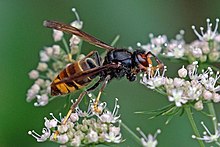Asian hornet
The Asian hornet (Vespa velutina) also known as the yellow-legged hornet or Asian wasp is a species of hornet originally found in Southeast Asia. It is a problem in many countries because it is a very invasive species.[1]
| Asian hornet | |
|---|---|

| |
| Scientific classification | |
| Domain: | Eukaryota |
| Kingdom: | Animalia |
| Phylum: | Arthropoda |
| Class: | Insecta |
| Order: | Hymenoptera |
| Family: | Vespidae |
| Genus: | Vespa |
| Species: | V. velutina
|
| Binomial name | |
| Vespa velutina Lepeletier, 1836
| |
The hornet is smaller than its European relative, known as the European hornet. Queens are usually 30 mm (1.2 in) long, and males are usually about 24 mm (0.95 in) long. However, the workers are smaller than both the males and queen, at about 20 mm (0.8 in) long.[2] The tarsi (legs) of the hornet are a bright yellow, and the body has a brownish color. The head is a yellow and black pattern, and the abdomen has a yellow border with a black fill; although, the end of the abdomen is orange. The hornet has many different colorations, making it hard for scientists to classify subspecies.

Like all other hornets in the genus Vespa, these hornets build nests to house their workers, young, and the queen. The population of one nest may range in the thousands. Workers are usually armed with powerful stingers, while drones (males) are not armed with stingers. The nest is usually shaped like an egg, and is half a meter long. During their nesting season, they build their nest in a low shrub, then build up high (usually in a tree), possibly as a way to avoid parasites. New queens usually are birthed around fall. The hornets hunt a range of insects, such as dragonflies, flies, and orthopterans. They hunt down their prey by chasing them. They also hunt honeybees, which is a problem in places where the hornets are invasive.
Many governments have tried to remove the invasive hornet, usually by nest destruction.[source?]
Other websites
changeReferences
change- ↑ Tan, K.; Radloff, S. E.; Li, J. J.; Hepburn, H. R.; Yang, M. X.; Zhang, L. J.; Neumann, P. (Jun 2007). "Bee-hawking by the wasp, Vespa velutina, on the honeybees Apis cerana and A. mellifera". Naturwissenschaften. 94 (6): 469–72. doi:10.1007/s00114-006-0210-2. PMID 17235596. S2CID 7218693.
- ↑ Lee, John X. Q. "Vespa velutina". vespa-bicolor.net. Archived from the original on 10 February 2018.